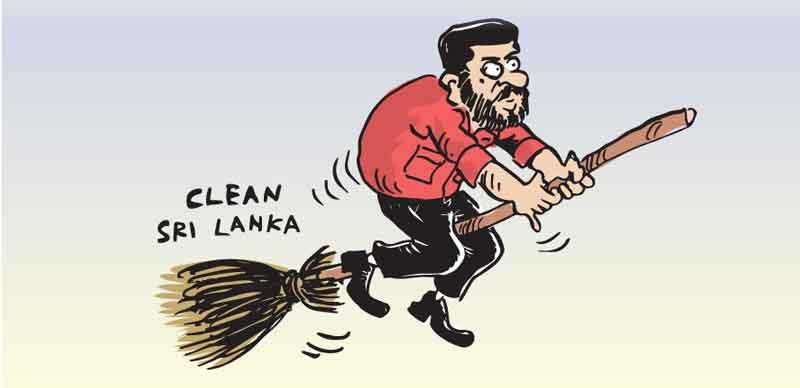02 Jan 2025 - {{hitsCtrl.values.hits}}

On the first working day of the New Year, the government launched its Clean Sri Lanka programme, aimed at ‘rebuilding a fractured nation’ as described President Anura Kumara Dissanayake. An 18-member Task Force was appointed by the President himself in order to plan and implement the programme. The appointment of this Task Force and its objectives were made official via an Extraordinary Gazette Number 2415/59 dated 19 December 2024.
In his New Year message, President Dissanayake mentions that some of the government’s primary developmental goals include eradicating rural poverty, implementing the “Clean Sri Lanka” initiative, and building a digital economy. The ‘Clean Sri Lanka’ initiative, launched alongside the New Year, aims to uplift society to greater heights through social, environmental, and ethical revival. This is particularly true for a country that is striving to become a cleaner city, despite having slogans reflecting similar messages. For instance, even though the Colombo Municipal Council carries the tagline ‘Keep the city clean’ little progress has been made to resolve the solid waste management crisis within the Western Province. As a solution to this crisis, the Kerawalapitiya waste-to-energy project was subsequently initiated in 2021. The plant has a capacity to incinerate 600-800 tonnes of waste every day and provides 10 MW of electricity to the national grid.
But this power plant is built on the borders of the Muthurajawela wetland. Despite the government’s efforts to strive for a cleaner Sri Lanka, certain practical challenges and discrepancies need to be cleared. Even though Colombo has been acknowledged as a RAMSAR wetland city, the city is inundated with floods even during the slightest rain. Even though the Muthurajawela wetland is known to be the ‘Lungs of Colombo’, this protected expanse of land has been heavily encroached by private companies to a point where the entire wetland is now under threat of becoming a mega industrial park. On the other hand, more wetlands are being filled with solid waste to construct commercial projects and all these efforts seem to be short-sighted decisions to resolve the solid waste management crisis. Waste, on the other hand is a lucrative business and it is a known fact that somebody allegedly had a vested agenda to make a buck out of the waste containers that came all the way from UK in 2019.
While wetlands in Colombo and suburbs continue to be encroached, while the government is trying to resolve the solid waste management crisis, while more trees that once punctuated the roads in Colombo continue to be felled, one certainly may wonder as to why they need to care about the environment anymore. In addition, environmentalists and conservationists were heavily criticised over the past few months for advocating against certain short-sighted decisions taken by the government. Such behaviours by the political leadership had occurred in the past as well. During former President Gotabaya Rajapaksa’s tenure, various ad hoc decisions were taken as means of protecting the environment but they proved to be futile. One of them was the ban on single-use plastics and sachet packets. Despite being a significant move to protect the environment, there had been poor monitoring and law enforcement on the part of the authorities.
The government needs to be appreciated for its effort to launch a programme of this nature to inculcate moral social behaviour among the masses. Recently, the CMC announced that there had been a surge in garbage disposed within the Colombo municipality during the festive season. Almost every nook and corner of Colombo has been littered and one could barely find at least one clean street. But keeping the environment clean goes beyond throwing garbage to a respective dustbin. It requires discipline and moral upbringing.
Even though people have been advised to throw garbage to respective bins, it is only in a rare occasion that one would take the effort to go looking for a dustbin to throw away the waste, not forgetting university students and dedicated groups who continue to conduct ‘shramadana’ campaigns to keep the environment clean.
If the President aims to rebuild a fractured nation through the Clean Sri Lanka programme, then it has to go beyond a programme to fulfil a campaign promise and ensure that all citizens are given a sense of responsibility to keep the environment clean as entitled by Article 28(f) of the Sri Lankan Constitution.
04 Jan 2025 3 hours ago
04 Jan 2025 3 hours ago
04 Jan 2025 3 hours ago
04 Jan 2025 5 hours ago
04 Jan 2025 5 hours ago